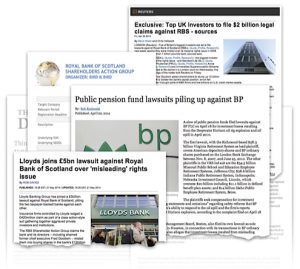Fiduciary Risks

The Challenge & Opportunity for Institutional Investors
There are significant fiduciary challenges in many institutional investors’ management of DIVIDEX® as an asset. First, most employ few or no mechanisms to self-identify, evaluate and manage exposures to potential securities fraud claims arising from holdings purchased on domestic and foreign exchanges (outside the United States).
For investors that rely on plaintiffs’ law firms to perform some of these functions, we believe that implicates risk of potentially conflicted advice and modest if any benefit for potential non-U.S. cases.
To the extent fiduciaries wish to consider being active in securities litigation cases, there is the further challenge of how to work with outside legal counsel: the inherent conflict of interest in allowing the same lawyers to both evaluate the merits of potential cases and to seek lucrative appointment as class counsel. Ideally, fiduciaries have two sets of lawyers: one to evaluate cases and one to act as their counsel in class actions, but this is difficult to achieve.
In contrast, DIVIDEX provides independent, unbiased evaluation of potential securities fraud class actions through engagement of its affiliated law firm, BLA Schwartz, PC, which will not seek class counsel appointment or accept compensation from plaintiffs’ counsel. As a result, evaluations through DIVIDEX are free of this potential conflict of interest.
Fiduciaries also face challenges in recovering class action payouts in the full amount due to them. DIVIDEX actively monitors all pending class action claims to seek to improve client outcomes such as by identification and evaluation of opt-out opportunities, potential objections to excessive fees and the like. When a securities class action settles and a plan sponsor is entitled to share in the proceeds, DIVIDEX applies a proprietary methodology that uses portfolio data normalization and analysis at the claims submission stage to seek to improve entitlements to recoveries.
Further, just because there is a court-ordered securities litigation payout does not mean investors always receive the full amount of settlement funds that they are owed. Importantly, full recovery requires reconciliation against what is due, which is something that most institutional investors have no way to do. Most institutions lack controls to independently verify the accuracy of their claims filings and recovery reporting, whether done by custodians or third party claims filing firms.
As a result, most investors have no way to reconcile or audit revenue collected from securities class actions settlements to ensure they are receiving all that is due to them. This is why DIVIDEX Management built recovery reconciliation into its service offerings.
For litigation involving non-U.S. portfolio securities, third-party litigation funders often seek claimants on an ad hoc basis. Investors that are unaware of these cases in formation can miss significant recovery opportunities for their portfolios.
We believe that recovery of DIVIDEX® may be improved through active management of recovery actions seeking to address securities fraud in global portfolios and pending class actions. In addition, we believe ESG investors need a system to ensure that companies in which they are invested abide by the principles that drove the investment as well as advice when those companies violate of those principles, such as in the Volkswagen emissions scandal.
In addition, we believe that recoveries may be improved through better portfolio data normalization and analysis at the claim submission stage and reconciliation of recoveries against recognized losses. This is why we developed proprietary systems to make those calculations to seek to help clients establish controls to ensure they receive all that is due to them.
Further Fiduciary Risks — Traps For The Unwary
Morrison and ANZ Securities cases —
affecting institutional investors and plan sponsors

Two relatively recent United States Supreme Court decisions have added further complexity to fiduciaries’ duties to address potential securities fraud claims arising from their portfolios. Under the United States Supreme Court’s decision in Morrison v. National Australia Bank Ltd., investors that purchase securities on exchanges outside the United States may not avail themselves of U.S. federal securities laws in connection with these holdings. This forces investors that seek to address losses in global portfolios due to alleged securities fraud to seek out, evaluate and join securities cases filed outside the United States, and manage risks associated with litigation funding and potential adverse party cost (loser pays) awards.
In California Public Employees’ Retirement System v. ANZ Securities, Inc., the Supreme Court held that a time bar (“Statute of Repose”) for federal securities claims continues to run notwithstanding the filing of a class action that tolls the Statute of Limitations.
Accordingly, when a fiduciary is a passive class member, its opt-out rights become meaningless after the Statute of Repose expires and it may not always wait for class action settlement to evaluate opt-out opportunities.
DIVIDEX helps fiduciaries address the additional complexities due to these United States Supreme Court decisions.
DISCLAIMER
These are issues that we believe arise from recent court decisions and are not legal conclusions or legal advice.